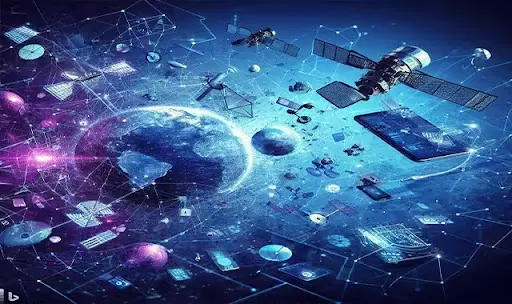Global technology developments
Technology is changing the world at an unprecedented pace. From artificial intelligence to biotechnology, from blockchain to quantum computing, new innovations are transforming every aspect of our lives, society and economy. In this blog post, we will explore some of the latest and most impactful global technology developments that are shaping our future.
Artificial intelligence (AI) is the ability of machines to perform tasks that normally require human intelligence, such as reasoning, learning, decision making and creativity. AI has been advancing rapidly in recent years, thanks to the availability of large amounts of data, powerful computing resources and breakthroughs in algorithms. AI applications are already widespread in various domains, such as health care, education, entertainment, finance, security and transportation. Some examples of AI achievements include:
- AlphaFold, a deep learning system developed by Google's DeepMind, that can predict the 3D structure of proteins with unprecedented accuracy, enabling new discoveries in biology and medicine.
- GPT-3, a natural language processing system developed by OpenAI, that can generate coherent and diverse texts on any topic, given a few words or sentences as input.
- DALL-E, a generative image system developed by OpenAI, that can create realistic and imaginative images from text descriptions, such as "a pentagon made of bananas" or "a snail wearing a sombrero".
- DeepMind's AlphaGo and AlphaZero, that can master complex games such as Go and chess without any human guidance, surpassing the best human players in the world.
Biotechnology is the use of living organisms or their components to produce or modify products or processes for specific purposes. Biotechnology has been revolutionizing the fields of medicine, agriculture, industry and environment. Some examples of biotechnology breakthroughs include:
- CRISPR-Cas9, a gene editing tool that can precisely alter the DNA of any organism, enabling new possibilities for curing diseases, enhancing traits and creating novel life forms.
- mRNA vaccines, a new type of vaccines that use messenger RNA molecules to instruct cells to produce proteins that trigger immune responses against pathogens, such as the coronavirus that causes COVID-19.
- Synthetic biology, a discipline that combines engineering and biology to design and construct new biological systems or reprogram existing ones for useful purposes, such as producing biofuels, drugs or materials.
- Organoids, miniaturized and simplified versions of organs that are grown from stem cells in a laboratory, mimicking their structure and function. Organoids can be used for studying diseases, testing drugs and potentially replacing damaged tissues.
Blockchain is a distributed ledger technology that enables secure and transparent transactions without intermediaries. Blockchain has been disrupting the financial sector by enabling new forms of digital currencies, such as Bitcoin and Ethereum, as well as smart contracts, which are self-executing agreements that are encoded on the blockchain. Blockchain applications are also expanding to other domains, such as supply chain management, identity verification, voting systems and social media. Some examples of blockchain innovations include:
- DeFi (decentralized finance), a movement that aims to create an open and global financial system that is accessible to anyone with an internet connection, without relying on centralized institutions or intermediaries. DeFi platforms allow users to lend, borrow, trade and invest in various assets using blockchain-based protocols and applications.
- NFTs (non-fungible tokens), unique and indivisible digital tokens that represent ownership of any type of digital or physical asset, such as art, music, videos or collectibles. NFTs are created and traded on blockchain platforms using smart contracts and cryptographic signatures.
- DAOs (decentralized autonomous organizations), organizations that are governed by rules encoded on the blockchain instead of by human authorities. DAOs can operate autonomously or collaboratively with their members or stakeholders to achieve common goals or objectives.
- Web3 (web 3.0), a vision for a decentralized and user-centric web that is powered by blockchain technology and peer-to-peer networks. Web3 aims to create a more open, fair and secure internet that respects users' privacy and sovereignty over their data and digital assets.
Quantum computing is a paradigm that exploits the quantum mechanical properties of subatomic particles to perform computations that are impossible or impractical for classical computers. Quantum computers can process massive amounts of data and solve complex problems faster than conventional computers by using quantum bits or qubits, which can exist in superpositions of two states (0 or 1) simultaneously. Quantum computing has been advancing rapidly in recent years, thanks to the efforts of both public and private sectors. Quantum computing applications are expected to have profound impacts on various fields, such as cryptography, optimization, simulation, machine learning and artificial intelligence. Some examples of quantum computing milestones include:
- Quantum supremacy (or quantum advantage), the demonstration of a quantum computer performing a task that is beyond the reach of any classical computer in a reasonable amount of time. In 2019,
Google claimed to have achieved quantum supremacy by using its 53-qubit quantum processor, Sycamore, to perform a specific calculation in 200 seconds, which would take the world's most powerful supercomputer 10,000 years to complete.
- Quantum internet, a network that connects quantum devices and enables quantum communication and computation over long distances. Quantum internet can offer unprecedented levels of security, speed and scalability, as well as new functionalities, such as quantum teleportation and quantum key distribution. In 2020, China launched the world's first quantum satellite network, which can transmit entangled photons across thousands of kilometers.
- Quantum algorithms, mathematical procedures that can run on quantum computers and exploit their unique capabilities to solve problems more efficiently than classical algorithms. Some examples of quantum algorithms include Shor's algorithm, which can factor large numbers and break public-key cryptography; Grover's algorithm, which can search unsorted databases and speed up brute-force attacks; and quantum machine learning algorithms, which can enhance the performance and accuracy of data analysis and artificial intelligence.
These are just some of the global technology developments that are shaping our future. Technology is a powerful force that can bring both opportunities and challenges for humanity. It is up to us to use it wisely and responsibly, for the benefit of ourselves and future generations.

